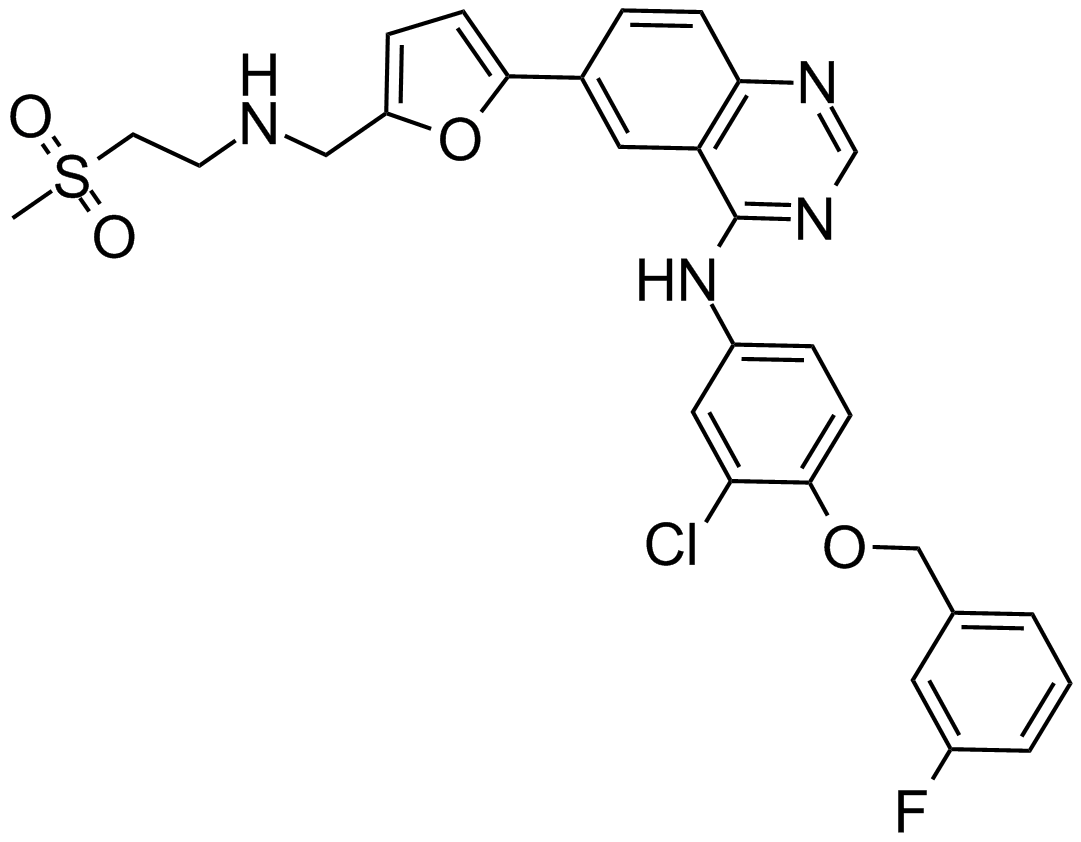Lapatinib (Synonyms: GW572016; GW2016) |
| Catalog No.GC13608 |
A dual inhibitor of EGFR and ErbB2
Products are for research use only. Not for human use. We do not sell to patients.

Cas No.: 231277-92-2
Sample solution is provided at 25 µL, 10mM.
Lapatinib (also known as GW572016), a member of the 4-anilinoquinazoline class of kinase inhibitors, is a potent, reversible and selective small-molecule inhibitor of both epidermal growth factor receptor (EGFR) and human epidermal growth factor receptor 2 (HER-2) tyrosine kinases that inhibits recombinant EGFR and HER-2 tyrosine kinases in cell-free biochemical kinase assays with values of 50% inhibition concentration IC50 of 10.8 nmol/L and 9.3 nmol/L respectively. Lapatinib interferes with the adenosine triphosphate binding in the tyrosine kinases domains of both EGFR and HER-2 resulting in the inhibition of auto-phosphorylation and resultant downstream signaling activities (such as cellular proliferation and survival).
Reference
[1].Alison Reid, Laura Vidal, Heather Shaw and Johann de Bono. Dual inhibition of ErbB1 (EGFR/HER1) and ErbB2 (HER2/neu). European Journal of Cancer 43 (2007) 481-489
[2].Norio Kondo, Mamoru Tsukuda, Yukari Ishiguro, Machiko Kimura, Kyoko Fujita, Atsuko Sakakibara, Hideaki Takahashi, Gabor Toth and Hideki Matsuda. Antitumor effects of lapatinib (GW572016), a dual inhibitor of EGFR and HER-2, in combination with cisplatin or paclitaxel on head and neck squamous cell carcinoma. Oncology Reports 23: 957-963, 2010
[3].Zev A. Wainberg, Adrian Anghel, Amrita J. Desai, Raul Ayala, Tong Luo, Brent Safran, Marlena S. Fejzo, J. Randolph Hecht, Denni J. Slamon and Richard S. Finn. Lapatinib, a dual EGFR and HER2 kinase inhibitor, selectively inhibits HER2-amplified human gastric cancer cells and is synergistic with trastuzumab in vitro and in vivo. Clin Cancer Res 2010; 16(5): 1509-1519
Average Rating: 5 (Based on Reviews and 30 reference(s) in Google Scholar.)
GLPBIO products are for RESEARCH USE ONLY. Please make sure your review or question is research based.
Required fields are marked with *




